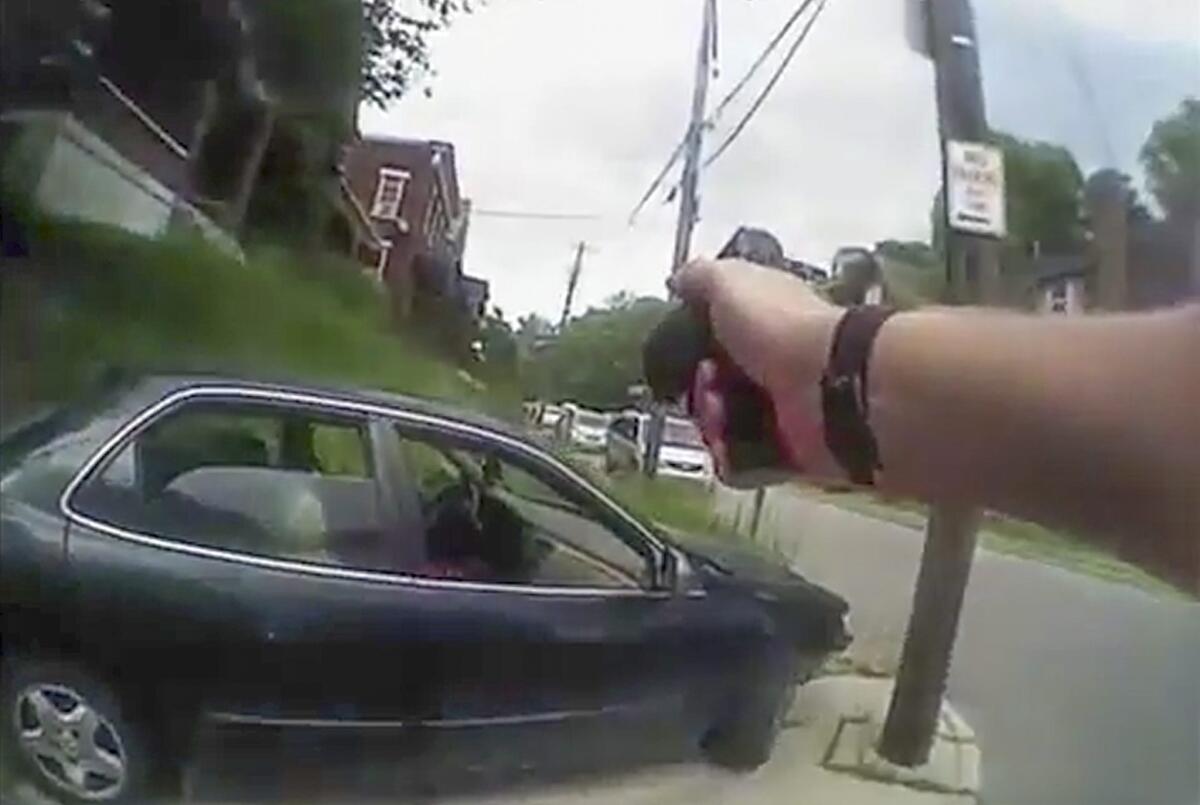Perspective: Cincinnati body-cam images made us players in a video game

A frame grab from a body-cam video shows University of Cincinnati Police Officer Ray Tensing approaching Samuel DuBose’s vehicle right after Tensing shot him during a traffic stop.
Imagine this video game scenario: You’re a white police officer in Cincinnati, and you’ve just made a traffic stop. There’s a black man named Samuel DuBose in the car, and you are talking to him through his open window. Both of you are speaking calmly. You try to open the door, but he holds it shut.
You pull out your gun and shoot him in the head.
Over the past two years, the world has seen a sudden uptick in videos depicting police brutality against blacks. Eric Garner’s death in New York City was captured on a bystander’s mobile phone camera. So was that of Walter Scott, who was shot as he fled from an officer in North Charleston, S.C.
Those videos were taken from a third-person angle, and viewers are witnesses, bystanders.
Warning: Video has graphic content
But the July 19 killing of Sam DuBose was captured on a police body camera, bringing the viewer much closer to the action. And there is something viscerally different about viewing a shooting from the first-person perspective.
In fact, the body-cam footage looks eerily like footage from a video game. Just as in first-person shooters like “Call of Duty” or “Halo,” we never see the officer-protagonist’s face or full body -- only his hands, as he gestures or holds his weapon. We see the story progress from a simple traffic stop, and get just enough time to feel at ease with the calm conversation. So when the single shot is fired, the viewer may be jolted out of the narrative to wonder, why did I do that?
Not why did he do that, but why did I do that?
Zolani Stewart, founding editor of video game criticism magazine The Arcade Review, believes this is precisely what happens in the video.
“When we watch this video,” Stewart said, “we’re not feeling empathy for DuBose as he’s being questioned, but we’re not really feeling empathy for the harsh struggle of being a police officer either. If we had a third-person view, we could choose to empathize with either of them, but because it’s first person, we become the officer. So we are forced to relate to the physical feeling of doing an act of violence.”
Stewart also thinks the first-person nature of the video may have something to do with the delay of the release of the footage. Before the video’s release, authorities said the footage was “not good,” and the University of Cincinnati canceled all classes Wednesday, citing not only the grand jury’s decision to indict Officer Ray Tensing on murder charges, but the impending release of the video. Ohio State Patrol officers were deployed to the campus, and Cincinnati Mayor John Cranley said his department was “prepared to deal” with protests.
“I think the angle of the video is part of why the Police Department was so anxious about releasing it,” Stewart says. “For the viewer, it’s a horrible experience.”
Dr. Kishonna Gray, who teaches a course called Video Games, Culture & Justice at Eastern Kentucky University, is concerned with what she sees as a lack of empathy in reaction to police shootings. “As an audience of the news, black people view police violence as a very real thing. But for some people, it’s simply not relevant,” she said.
Gray says many people who are uninterested in the Black Lives Matter movement are “just getting fatigued by these videos.”
But she has cautious hope that this video may inspire some self-reflection among Americans. “I hope this makes us feel uncomfortable. The immersive viewpoint should make us all feel implicated, and make us ask ourselves if we should be changing something about ourselves as a nation.”
Gray compares the DuBose video to the open-casket funeral of Emmitt Till, when images of his mangled body were widely reprinted and drew international attention to the injustices in the Jim Crow South of the 1950s.
“People like me, who have followed and supported the Black Lives Matter movement, don’t need to see violence from a new angle to be moved,” she says. “But maybe others do.”
Follow me @dexdigi for more on the intersection of culture and the Internet.
ALSO:
GARDENA POLICE SHOOTING: Interactive look at the incident that left one man dead and another wounded
Aurora shooting trial: James Holmes, as seen through his mother’s tearful eyes
UVA alumni sue Rolling Stone over discredited rape story
MH370: Debris discovery on Réunion Island brings ‘significant development’
More to Read
Sign up for Essential California
The most important California stories and recommendations in your inbox every morning.
You may occasionally receive promotional content from the Los Angeles Times.










